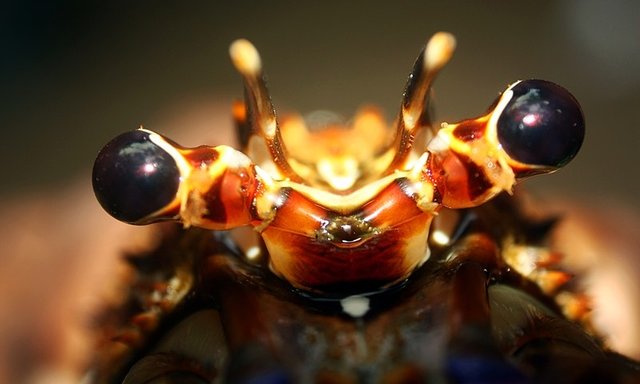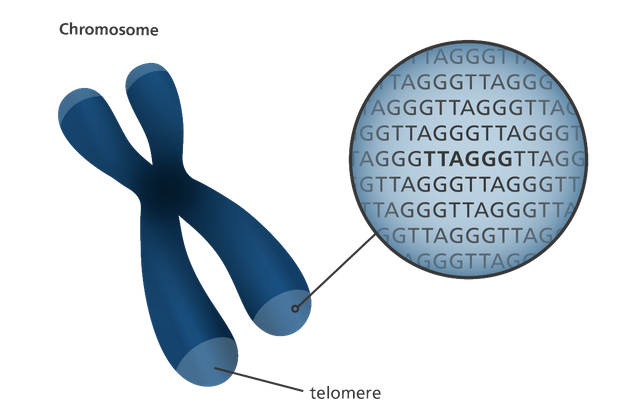Do Lobsters hold the secret to immortality?
How cute! Image Source
There is still no scientific consensus on whether lobsters feel pain or not (but people are actively working on the question). However, the Swiss federal government has recently asserted its empathy for these little creatures and declared it illegal to cook them alive. I am not Swiss, neither am I a big fan of seafood but I have to admit that the Lobster deserves recognition for more that its taste. To understand why, let’s first take a look at how aging works in humans.
Telomeres are biological timers
Most cells of our body (at the exception of reproductive cells and some other specific cell types) contain 23 pairs of chromosomes of various sizes. These chromosomes are fully duplicated at each cell division (or mitosis) to ensure the stability of the genomic information over time. This mechanism, called DNA replication, allows each dividing cell to transfer the totality of its genome to two daughter cells.
DNA replication is an incredibly complex mechanism involving many regulatory steps. It requires multiple proteins acting together to open the DNA double-helix and “scan” the chromosome, reading its nucleotide sequence while synthetizing a perfect copy of it in real time.
Because of some characteristics of this “scanning” mechanism that I will not detail here, the replication complex is unable to copy the DNA regions located at the extremities of chromosomes. As a consequence, a small part of each chromosome is lost during each replication cycle.
As you can imagine, the loss of genetic material at each division could have dramatic consequences for the cell. To solve this problem, the chromosome ends are composed of short nucleotide sequences repeated multiple times (between 500 and 3000 times in humans). These patterns form what we call the telomeres of the chromosome, which serve as a buffers to prevent the loss of critical genetic information during replication.
Telomeres also have other purposes. Notably, they are recognized by multiple proteins which prevent the fusion of chromosomes together (as we saw in this article, cells do not like free DNA ends). Telomeres are thus progressively consumed over time like genetic fuses or timers.
This progressive loss of the telomeres is not the only reason behind aging but, as they become too short, the genome loses in stability which leads to cellular dysfunctions. This instability is normally detected by the cell which, in consequence, enters senescence and dies. However, in some cases this could lead to cancers or other diseases.
The maximum number of divisions that a cell can undergo before entering senescence is thus “determined” in advance by the size of its telomeres and is called the Hayflick limit.
So what’s the deal with lobsters?
Lobster cells produce a specific enzyme called telomerase which is able to regenerate the telomeres by adding new repeats at their extremity, thus allowing the cells to divide virtually forever. This enzyme also exists in Human but is only produced in stem cells, hair follicles and some immune cells whereas it is ubiquitous in the cells of our crustacean friend. This explains why some lobsters could live up to 50 years and reach the terrifying weight of 20 kg (44 lb) when they don't end up in your delicious sandwich. So does that mean that they are immortal? No.
Even though they are able to hunt and reproduce until the end of their lives (old individuals are apparently even more fertile than younger ones), lobsters most of the time die of diseases or predation. And when they don’t, approximately 10% of them dies of exhaustion during moulting. One interesting characteristics of the lobster is indeed that they keep growing during their whole lives, which means that they needs to regularly change their rigid exoskeleton. Sadly for them, this process consumes a ridiculous amount of metabolic energy and it gets worst as the animal gets bigger, which ends up killing them… Sad story.
What does that mean for us Humans?
Researchers have shown that artificially forcing human cells to produce telomerase could make them immortal and avoid senescence. While this could be useful in a lab, trying to apply this method to a Human is very risky. Indeed, while the telomerase protects cells from some replication-associated mutations, it is also found active in up to 90% of cancers. The mechanism of senescence indeed allows the body to clear out cells that may have accumulated too many mutations over time, blocking it could thus mean taking the risk to keep alive dangerously mutated cells.
Telomerase might thus not give us the key to immortality, but this could be for the best, let’s remember that in the end even the glorious Lobster dies alone at the bottom of the ocean for wanting to become too big for its own skin.

Sources and further reading:
- Longevity in lobsters in linked to telomerase expression
- If you want to learn more about the Hayflick limit
- Expressing telomerase in normal human cells increases their life-span
- Changing life-style could increase the length of telomeres in cancer patients
- Telomerase as a therapeutic target
- The Guinness World Record page for the biggest lobster ever captured
- A good article on the same subject
- Starting next March, you will have to treat your meal in a humane way (at least in Switzerland)
- A nice review article on the dual role of telomerase in cancer


@originalworks
The @OriginalWorks bot has determined this post by @carlgbush to be original material and upvoted it!
To call @OriginalWorks, simply reply to any post with @originalworks or !originalworks in your message!
Congratulations @carlgbush, this post is the tenth most rewarded post (based on pending payouts) in the last 12 hours written by a Dust account holder (accounts that hold between 0 and 0.01 Mega Vests). The total number of posts by Dust account holders during this period was 7846 and the total pending payments to posts in this category was $2682.77. To see the full list of highest paid posts across all accounts categories, click here.
If you do not wish to receive these messages in future, please reply stop to this comment.
So here I am:)
It is just unbelievable what science is working on. And I must admit, that I too, do have my questions about the "why" of searching for immortality or stretch ones life span. As you know I am dealing with psychological topics and a huge part of what my work consists of is why people do get frustrated or are unhappy or discontent.
To relate to this topic my question to you would be: Would you accept a manipulation to your cells and get a Telomerase boost when it is guaranteed that your life will be stretched - let's say by twenty years - when would be the appropriate time for you to let that happen? When you already got old (40, 50, 60 years?) or in your age right now?
I am curious about your answer:)
Hey, happy that i caught your interest :)
What i find amazing is this is that the scientists who made the discovery were probably not looking for a tool that could lead us to immortality at all, but were more likely just studying the biology of lobsters. I think this is what makes the beauty of science.
Interesting question, I think I would not do it considering the risks but even if we suppose this would be safe, I generally don't like the idea of unnecessarily modifying our biology (which is strange for someone doing genetic engineering i guess). Senescence (and death) are not diseases, they are intrinsic parts of our existences and are necessary for us as individuals and as a species. Idealistically, one might say that 20 more years would give us more opportunities to achieve what we want but i don't think this is true.
I think that everyone reaches a point at a certain age where they feel like they are not in touch with societal changes anymore and not many 80-year old today would accept a treatment that would make them live 20 more years.
Lastly I don't think that the frustration of missed opportunities exists beyond death (but religious people might disagree) so maybe i would accept a potential treatment that would allow me to keep my mental faculties and run marathons until the end, but i would not try to change my lifespan :) What's your opinion ? Do you think the kind of treatment you mentioned would reduce some people's frustration ?
:-) Yes, indeed. The findings without purpose are quite interesting. Like it is said with "Penicillin" which was found by accident of leaving around a petri-dish - don't know if that is true, though. Do you know?
The beauty of science I think is when the scientist himself does not have a pre-set mind. Which is said that that is the method to carry one over the edge of prejudice and sticky notions. Not at all easy, I would say.
Thanks for answering the question. I must admit that I was hoping for this kind of reply (totally unscientific:)
I agree on your answer. I don't think it would lower frustration or change how people deal with death and age. If that would be the case, one would be totally fine to die right now and here. When I am not ready for the fact that I am mortal in the now, why should I be ready twenty years ahead?
Yes, an aging body or an already old one does give pain in many areas. My mother died age 86 and I can confirm that she wouldn't have wanted to stretch life. What kept her alive so long no one can really answer but I think one aspect was that she cared for us children and still was actively involved in our lives and those of her sister.
LOL. What you said about missed opportunities actually is a matter of life, not death - the Buddhist religion points that out a lot. Though the teaching is known for rebirth, what they actually are up to is leading a life in the now which should free itself from regret and doubt. I am studying Buddhism for quite a while and am amazed of how little we in the west know in fact about their fascinating philosophy and psychology.
I am happy finding a scientist of your caliber.
The story about Penicillin is absolutely true and it's a good example.
That's what i was pointing about opportunities, they should be a matter of present time, not in dreams of perpetual existence :) Good to see that we agree.
My mother is very interested in Buddhist philosophy and theology so I have been exposed to it a little bit in the past. Very interesting indeed, i think the way Buddhism (or Buddhist authorities) deal with scientific discoveries and changes in the world is a lot healthier than in monotheist religions (but they are so different, it's hard to compare).
I would be very interested in learning more about the cultural/political/historical differences that led two religions (i consider Christianity, Islam and Judaism to share the same system of values) to emerge and develop such different philosophies and relationships to the world.